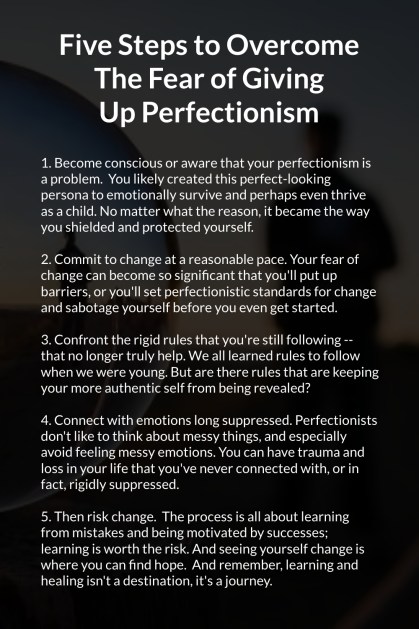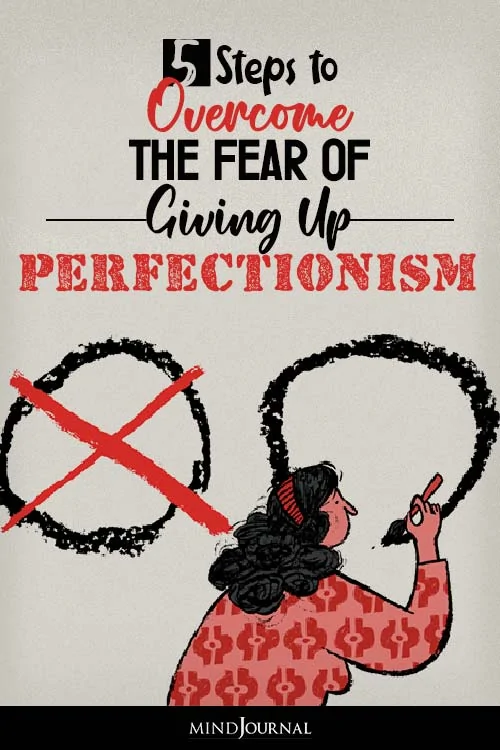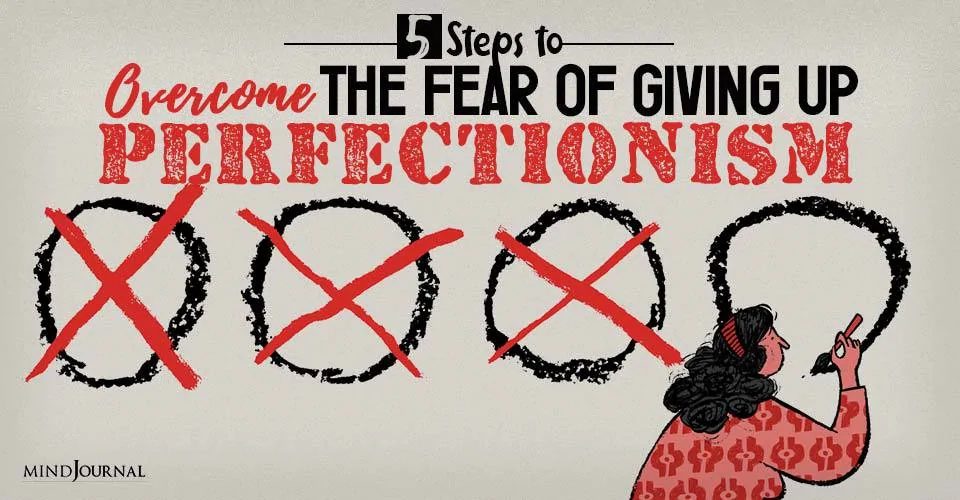Giving up perfectionism can be a tough and challenging journey, but definitely not an impossible one. Perfectionism can drive a wedge between you and your happiness, so letting it go is one of the best things you can do for yourself.
The steps in this post are the basis for the treatment for the kind of depression I discuss in my book, Perfectly Hidden Depression – which at its most severe, can become deadly – as the pressure to never fail, to never falter becomes more and more intense.
If you’re a perfectionist, it’s highly likely that you not only feel overwhelmed by the demands you place on yourself, you can also feel increasingly burdened by the ever-higher expectations that others develop for you.
Yet you can never.. ever… allow anyone to see your struggle.
Maybe you’re the teenage quarterback who has led your team to three state championships and now you’re being carefully watched by professional scouts. Or the young mother who’s been promoted at your job for your outstanding contributions, but you stay up late into the night to get that very work done. Perhaps you’re the attorney who has an almost perfect trial record, and now you’re attracting more and more difficult, time-consuming cases.
The pressure is intense. Yet not meeting these high expectations is something you cannot imagine – or you even fear.
Years ago, my at-the-time very perfectionistic self told a therapist, “If I don’t keep my thumb at my back, pushing myself every minute, I”m afraid that I’ll become a slug.”
Related: 17 Signs You Are An Overachiever And How To Deal
Your belief is it’s the pressure that brings with it success. You don’t believe that innately you have what it takes. And you fear that others will see your vulnerabilities.
Fear is what keeps perfectionism alive. Fear of not being on top, of looking like you don’t have it all together, of making mistakes that will be noticed, of rejection or judgment. Fear that you won’t be as good as you were last time. And the list goes on.
5 Steps To Take If You’re Caught Up In A Perfectionist Spiral
1. Become conscious or aware that your perfectionism is a problem.
You likely created this perfect-looking persona to emotionally survive and perhaps even thrive as a child. No matter what the reason, it became the way you shielded and protected yourself. Giving it up or tweaking it a bit can lead to even greater fear, but remember that staying the way you are can feel intensely lonely.
Here’s an example to illustrate the difference. You’re holding a pen in your hand, gently but firmly. There’s little chance that it will fall. But what if you grasp it as hard as you can? You’re still holding the pencil but in a way that will only lead to exhaustion.

2. Commit to change at a reasonable pace.
Your fear of change can become so significant that you’ll put up barriers, justifying your frenzied life by saying, “It won’t get done if I don’t do it.” Or, “I’m the breadwinner in the family. We can’t get along on less money.” Or you’ll set perfectionistic standards for change, and sabotage yourself before you even get started. “I’ll lose ten pounds in two weeks.” Or, “I’ll give up all my responsibilities.”
Way too much, way too soon. Change needs to be gradual and gentle.
Related: 10 Signs You’re Perfectionistic and How To Overcome
3. Confront the rigid rules that you’re still following — that no longer truly help.
We all learned rules to follow when we were young. You could probably sit down and write them out. “Don’t chew with your mouth full.” Or, “Always be kind.”
But are there rules that are keeping your more authentic self from being revealed? “I can never show anger.” Or, “I can’t quit until the job’s done.” Look for rules that are the “shoulds” and “oughts” in your life.
4. Connect with emotions long suppressed.
Perfectionists don’t like to think about messy things, and especially avoid feeling messy emotions. You can have trauma and loss in your life that you’ve never connected with, or in fact, rigidly suppressed. It’s hard to do, and you may need a therapist’s help to do so.
But as Terrance Real once wrote, “If you don’t feel it, you live it.” This is very true; ignoring emotions doesn’t make them go away. They continue to lurk in the background and do affect your life
5. Then risk change.
The process is all about learning from mistakes and being motivated by successes. I’ve laughed reading some of my first blog posts; I went through a period when I thought sentence fragments were very cool. One commenter on the Huffington Post called me out on it, “This woman can’t even make a full sentence.” She was right; I was learning and I’ll probably look back five years from now and laugh at what I’m doing today.
But the learning is worth the risk. And seeing yourself change is where you can find hope.
And remember, learning and healing isn’t a destination, it’s a journey.
Related: 9 Signs You Might Be Perfectionistic
Pulling out of the perfectionist spiral is a process; and one that is particularly difficult precisely because you’re a perfectionist. You don’t have to be perfect and not being perfect…again, it’s a journey. Allow yourself this opportunity to imperfectly practice giving up perfectionism.
Check out Dr. Margaret Rutherford’s best-selling book, Perfectly Hidden Depression on Amazon.
Written By Dr. Margaret Rutherford Originally Appeared On Dr. Margaret Rutherford









Leave a Reply
You must be logged in to post a comment.